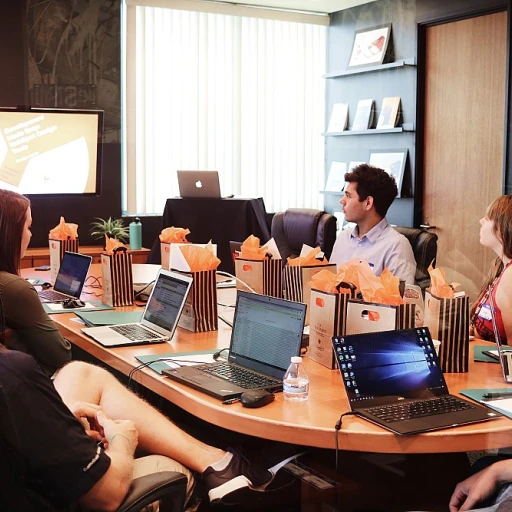
The Role of the Employee Handbook in Retention
The Importance of Employee Handbooks in Retention Efforts
When it comes to employee retention, the McDonald's employee handbook plays a crucial role. It serves as a comprehensive guide that outlines the terms and policies every staff member, from cash handlers to managers, needs to be aware of. This manual not only dictates the operational standards but also embodies the essence of workplace culture at a McDonald's restaurant. By clearly stating what is expected of employees, the handbook helps create a stable and predictable work environment.
An effective employee handbook acts as a touchstone for new hires during orientation, making it a fundamental resource they can apply to navigate through their roles. An easily accessible copy, be it in PDF format for download or as a physical document, allows employees to continuously reference McDonald's policies. This accessibility ensures that everyone is informed about their responsibilities, thus reducing misunderstandings and promoting a sense of accountability. Having clarity on these policies not only enhances employee satisfaction but is also vital for addressing any issues that may arise, such as disputes over term accounts or relevant contact procedures.
Furthermore, the employee handbook sets the groundwork for a harmonious workplace culture. As discussed in other sections, creating a positive work environment and fostering effective communication channels are integral to staff retention. An employee's first encounter with the handbook can significantly influence their perception of the workplace, impacting their decision to stay or move on.
Integrating key policies that cater to employee satisfaction is imperative, as outlined in related sources on comprehensive compensation overviews. By focusing on clear, consistent, and fair policy execution, McDonald's can enhance job satisfaction and, consequently, employee retention.
Key Policies that Impact Employee Satisfaction
Essential Policies Influencing Employee Contentment
Understanding the pivotal role that policies play in employee satisfaction is crucial for any organization, and McDonald's is no exception. The McDonald's employee handbook, often accessible as a PDF or through McDonald policies resources, details several key policies that significantly impact how employees perceive their workplace. One of the top priorities is ensuring that policies around compensation and benefits meet the expectations of McDonald's diverse workforce. Employees value clear and fair policies on wages, scheduling flexibility, and comprehensive benefits packages. This clarity not only helps employees align with the restaurant’s operational terms but also serves as a foundation for building trust—a key factor in retention. The handbook also outlines policies related to workplace safety and health regulations. Ensuring these are rigorously applied reassures employees that their well-being is prioritized. Furthermore, having transparent anti-discrimination and harassment policies, and detailing the steps an employee should take if they experience or witness any violation, fosters a safe and inclusive work environment. Efficient contact and communication guidelines described in the manual encourage employees to voice their concerns and feel heard by managers. This is directly tied to positive employee morale and, consequently, retention rates. Moreover, McDonald’s orientation policies are crucial for setting the tone from day one. Not only do they offer a structured introduction to job responsibilities, but they also clearly outline the support employees can expect from their managers. In conclusion, nearly every policy—whether it is about managing employee cash responsibilities or applying for internal promotions—is designed to bolster the employee account experience. By fostering an environment where employees understand their role and feel supported and valued, McDonald's thrives in retaining its essential workforce even in its busiest restaurant settings. For those interested in deepening their understanding of how McDonald's policies and their strategic implementation influence retention across different sectors, explore the innovative strategies discussed at Enhancing Employee Retention with Advantage Workforce Services LLC.Training and Development Opportunities
Training Programs for Skill Development
Training and development opportunities play a crucial role in enhancing employee retention at McDonald's. These initiatives not only empower employees by improving their skills but also elevate job satisfaction, leading to a more committed workforce. The McDonald's employee handbook outlines these programs, emphasizing their importance in creating a robust work environment. The orientation process is a key aspect where employees familiarize themselves with their roles and responsibilities. Comprehensive training ensures that every employee, from cash handlers to team leaders, is equipped to handle their tasks confidently and efficiently. McDonald's provides various training modules available in their digital manual. Employees can download McDonald's pdf guides for specific tasks, ensuring they can access resources in real-time. This on-demand availability helps employees consistently align with the McDonald's policies and operational standards. Furthermore, ongoing development is facilitated through in-restaurant workshops and online courses. These opportunities allow employees to advance their careers within the company, fostering a culture of growth and loyalty. For new managers, specialized training programs are in place to help them address employee needs effectively. Managers are also required to stay updated on the latest policies and terms outlined in the employee handbook to maintain a harmonious work environment. Encouraging continual learning also involves identifying employees' unique strengths and tailoring development plans that meet their aspirations. Applying these principles cultivates a workplace where employees feel valued and motivated, ultimately reducing turnover rates. For individuals in need of more insight on how McDonald's aligns its training programs with employee retention strategies, relevant questions and discussion can be drawn from medical billing interviews as these often explore the depth of understanding policies and employee satisfaction. For more information, refer to key questions in medical billing interviews.Creating a Positive Workplace Culture
Fostering an Inclusive and Enjoyable Work Environment
Creating a positive workplace culture is an essential component of employee retention in McDonald's restaurants. As outlined in the McDonald's employee handbook, a supportive work environment not only enhances employee satisfaction but also significantly reduces turnover rates. This is particularly crucial in the fast-paced restaurant setting where employees must collaborate effectively to ensure seamless service. A McDonald's manager plays a pivotal role in cultivating an atmosphere where employees feel valued and motivated. By implementing clear policies from the handbook and maintaining open communication channels, managers can foster a sense of belonging among team members. This not only encourages better performance but also nurtures loyalty, as employees are more likely to remain with an employer who recognizes and appreciates their efforts. The McDonald's orientation process is another critical aspect contributing to the workplace culture. By ensuring that new employees understand the restaurant's values and expectations right from the start, managers can prevent misunderstandings and set the groundwork for a harmonious work environment. Providing comprehensive orientation materials, such as PDFs of the employee handbook, ensures that team members have easy access to policies whenever needed. Moreover, policies within the handbook emphasize the importance of maintaining a respectful and inclusive atmosphere. Encouraging diversity and addressing any issues swiftly reinforces a commitment to equity. For instance, implementing sections that outline anti-discrimination policies in clear terms ensures that employees are aware of their rights and can report any concerns without fear of reprisal. In a McDonald's restaurant, where cash handling, adherence to terms, and maintaining an accurate account during shifts are required, cultivating trust among employees is paramount. Managers can facilitate a positive culture by recognizing individual contributions, celebrating achievements, and organizing team-building activities. By downloading the McDonald's manual and reviewing policies, both managers and employees can work toward creating a more inclusive and enjoyable workplace environment, leading to better retention outcomes.Feedback and Communication Channels
Establishing Effective Communication Channels
A crucial aspect of employee retention at McDonald's involves creating efficient feedback and communication pathways. In the ever-busy environment of a McDonald's restaurant, establishing open lines of communication is essential for understanding and addressing the needs of employees. The Employee Handbook [PDF] is a valuable tool for this, laying out established guidelines and methods for employees and managers to communicate effectively.
It's important for McDonald's managers to foster an environment where employees feel comfortable providing feedback. This could involve regular check-ins where employees can discuss their experiences and concerns. Utilizing such opportunities helps to reinforce the policies and expectations outlined in the handbook, ensuring they are consistently applied.
Additionally, ensuring employees are aware of the specific individuals or departments to contact for different issues can help streamline communication. For example, the handbook may include details on who to approach for policy clarifications, orientation questions, or personal queries. Explicitly stating contact points helps avoid confusion and ensures efficient resolution of employee queries.
The goal is to create a workplace culture where clear communication is prioritized. By facilitating dialogue and feedback, McDonald's not only enhances employee satisfaction but also aids in the early identification of potential problems, thereby aligning with their policies to adapt to employee needs and expectations. This, in turn, contributes to an overall positive work environment, as employees feel heard and valued.
Adapting to Employee Needs and Expectations
Embracing Flexibility and Responsiveness
In the fast-paced environment of a McDonald's restaurant, adapting to employee needs and expectations is crucial for retention. The employee handbook serves as a foundational document, but it must be flexible enough to accommodate the evolving demands of the workforce. This adaptability is not just about changing policies; it's about understanding the unique challenges and aspirations of each employee.
Understanding Employee Expectations
Today's employees, especially in a dynamic setting like a McDonald's, expect more than just a paycheck. They seek a workplace that values their contributions and supports their growth. Managers should regularly review the employee handbook and mcdonald policies to ensure they align with current employee expectations. This might involve updating orientation processes or revising terms of employment to reflect modern workplace standards.
Implementing Feedback Mechanisms
Feedback is a two-way street. While employees are encouraged to provide input, managers must also be open to receiving it. Establishing clear feedback and communication channels can help identify areas where the employee handbook or mcdonald policies might need adjustments. Regularly scheduled meetings or anonymous surveys can be effective tools for gathering this information.
Leveraging Technology for Adaptation
Technology can play a significant role in adapting to employee needs. Providing digital access to the employee handbook via download options or a pdf format ensures that employees can easily access the information they need. This approach not only enhances transparency but also empowers employees to familiarize themselves with mcdonald policies at their convenience.
Creating a Supportive Environment
Ultimately, the goal is to create a supportive environment where employees feel valued and heard. By continuously adapting the employee handbook and related policies to meet the needs of the workforce, McDonald's can foster a positive workplace culture. This proactive approach not only aids in retention but also enhances overall employee satisfaction.













